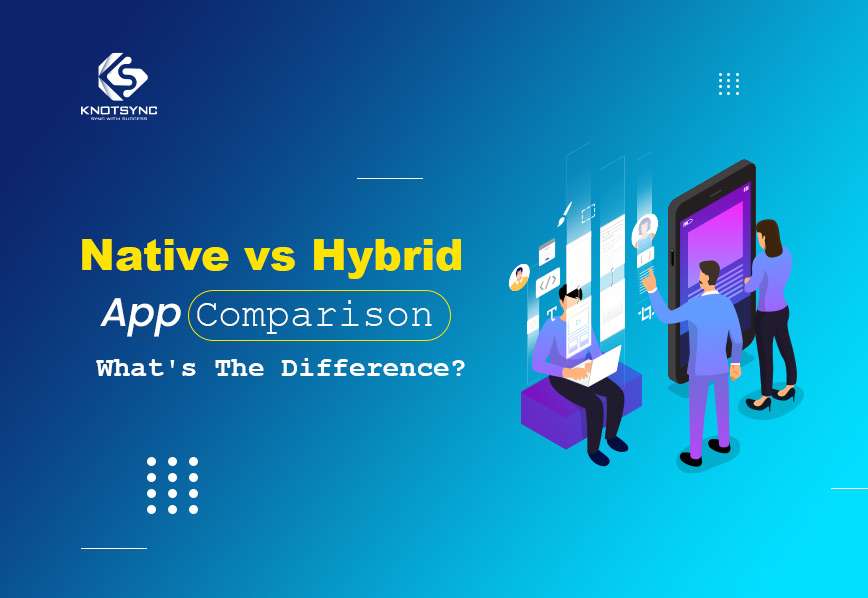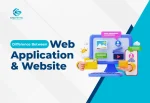Mobile applications are dynamic business software tools. Presently, they serve as a standard to interact with clients and users for their daily needs like grocery shopping, banking, travel ticket booking, entertainment, and whatnot! With mobile apps, users can get the timely and convenient experience they seek. Due to consistent technological innovation, there is no doubt that businesses rely on apps more than ever before.
According to an online report by Statista, the total number of app downloads was 299 billion worldwide. The mobile app development industry is on the rise, and when it comes to mobile app development services, the good and bad news is that – YOU HAVE OPTIONS! However, having options for your business is a severe impediment and has its challenges, which could be overwhelming for someone unfamiliar with app development.
For example, the debate on Native vs. Hybrid app development. What is the best approach – a native app for one specific platform or a hybrid app for its versatility? This depends on various key factors that we will discuss in this blog. So, let’s see the difference between Hybrid and Native apps and understand which development method suits you.
Native vs Hybrid App: What are the Key Differences?
As mobile applications continue to dominate the digital landscape, businesses and developers face the decision of choosing between native and hybrid apps. Understanding the differences between hybrid and native apps is crucial for making an informed decision. Let’s dive deeper into the topic to get the right information on Native vs Hybrid apps.
*(Let’s understand this concept with a Native and Hybrid app examples and other features in this table)
| Characteristics | Native Apps | Hybrid Apps |
|---|---|---|
| Development Language | iOS – Swift, Objective C Android – Kotlin, JAVA |
HTML, CSS, JavaScript Frameworks: Iconic, PhoneGap |
| Development Approach | It is platform-specific, requires a separate codebase for iOS and Android | It is for multiple OS and needs just one codebase for all platforms (iOS, Android, Windows) |
| Time & Cost | A massive budget is required to develop a native app that will be compatible with multiple platforms (iOS and Android) | You are using one codebase across platforms, which takes less development time and maintenance; thus, it’s cost-effective |
| Performance | High with smooth interactions | Good, but it may not match mobile apps |
| User Experience | Optimal, tailored to each platform | Good, it tries to mimic the native experience |
| Accessibility | Functions on one OS at a time | Works at multiple platforms at a time |
| Maintenance | They require high maintenance | They require low-maintenance |
| Internet Access | Low, one-step access with offline features | Low, one-step access with offline features |
| Updating | Mobile apps can be updated from the App Store or Play Store | Mobile web apps are centralized |
| Examples | WhatsApp, Spotify, Instagram | Evernote, Uber, Gmail |
What Are Native Apps and What are Their Advantages?
Native apps are applications that are specifically built for a particular platform, such as iOS or Android, using the platform’s native programming languages and development tools. This would typically be Swift or Objective-C for iOS, JAVA, and Kotlin for Android. They are designed to run directly on the device’s operating system and have direct access to its hardware and software capabilities.
Here are the key advantages of native apps listed below:
- High Performance: Native apps are optimized for specific platforms, resulting in fast and responsive performance.
- Access to Native Features: Native apps can leverage device features like Camera, GPS, and push notifications for richer functionalities.
- Seamless User Experience: Native apps adhere to platform design guidelines, delivering a familiar and intuitive user interface.
- Enhanced Security: Native apps undergo app store vetting and leverage built-in platform security features.
- Offline Functionality: Native apps can work offline by the “cached data” of the device.
What Are Hybrid Apps and What Are Their Advantages?
Hybrid apps are essentially web apps packaged within a native app “container,” allowing them to leverage certain native platform features and device hardware, such as cameras, push notifications, and calendars. Simply put, a web app is an application that needs a browser to run, and in comparison, a native app runs by itself after one tap on the icon.
Therefore, hybrid apps combine elements of both web and native apps. Here are key advantages of hybrid apps listed below:
- One Codebase, Multiple Platforms: With a Hybrid app, you can develop once and across multiple platforms, saving time and effort.
- Faster Development: Hybrid apps utilize existing web technologies for more rapid development.
- Cross-Platform Compatibility: Hybrid apps are compatible with iOS and Android, ensuring a wider reach.
- Cost Effective: A hybrid app allows development with a single codebase, reducing development and maintenance costs.
- Seamless Integration of Web Technologies: Hybrid apps leverage existing web development skills and resources for feature-rich apps.
When to Choose Native and Hybrid?
Native application is the way to go if you want the best performance and good smooth user experience. Native apps are designed specifically for each separate platform, e.g. iOS or Android. Therefore, native apps are highly fast and use features like the camera, GPS, or notifications easily. The best option is for apps that require a polished look and feel, just like games or social media applications. Native apps take much longer and are more expensive to develop as the code needs to be written separately for each platform.
Hybrid applications are a good option if you want to get your app on multiple platforms without an additional hassle. In this regard, they appear to be much quicker to develop, typically cheaper, and very well-suited for simple apps such as ecommerce or news apps where less and sometimes almost nothing is required in terms of performance. Only one codebase will be created, so updating and managing will be faster than other alternatives. You can deploy faster and save costs, that might be a big advantage if you are working with the budget.
Is WhatsApp a Native App or Hybrid App?
WhatsApp is a native app. Native apps are built using the programming languages and tools specific to each mobile operating system, such as Swift or Objective-C for iOS and Java or Kotlin for Android. This makes WhatsApp a native application tailored to each operating system’s requirements and features.
Native apps like WhatsApp, Spotify, and Pokémon Go take full advantage of the capabilities of the device’s hardware they run on, providing optimal performance and seamless user experience.
Is Amazon App Native or Hybrid?
After searching, it seems that there is no clear consensus on whether the Amazon app is native or hybrid. While some sources suggest it may be a native, there isn’t enough definitive information to provide a conclusive answer.
It’s worth noting that Amazon utilizes different technologies across its various platforms, including native development for iOS and Android and web technologies for its web app. This suggests that the architecture of the Amazon app may differ based on the platform.
The Future of Native and Hybrid Development
Well, it appears that application development is always changing. With AI coming into native apps, they are getting smarter, so the experience looks more customized, and hybrid app frameworks like Flutter or React Native are gaining importance rapidly up to the level that is now in many ways competitive with native apps, making them fantastic for multiple platforms.
Native and hybrid apps become as fast as native and have better support for items like streaming and augmented reality with the advent of 5G networks. Then, by that time, maybe the hybrid vs native choice will not be a one about limitation anymore but will be what best fits your objective.
Conclusion
Both native and hybrid apps have their own strength and weaknesses depending on your priorities. However, if you generally consider the mobile trends and competitive market of the app industry, we recommend you go for laser-focused ‘Native Apps’ for its quality and reliability.
Now, you might say, “Native Apps are expensive to develop.”
Fortunately, there is a way to trade off cost quality. Our KnotSync mobile app development services developers use unique techniques to ensure the native apps give the best performance-to-price ratio.
Therefore, if you are intensely focused on your business goals, perhaps launching an app is for you. Contact Us Now and discuss how to hit your targets.




